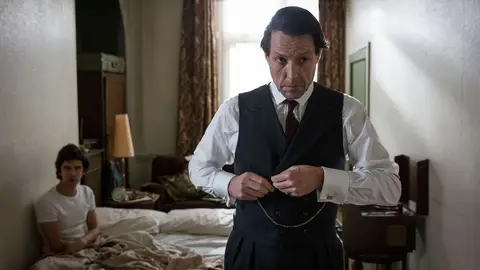Hugh Grant Is a Closeted, Conniving Politician in “A Very English Scandal”

"It was the last flicker of the grandeur of the British Empire establishment," says Hugh Grant of the infamous gay imbroglio depicted in his new Amazon series A Very English Scandal at a recent press event. In 1979, member of Parliament and leader of Brittan’s Liberal Party Jeremy Thorpe was tried, along with several others, for conspiring to murder his former lover, Norman Scott (née Josiffe).
"The Britain in which an establishment figure like Thorpe could sort anything out with a quiet word...it's not happening anymore."
The three-part miniseries, which aired earlier this year in the U.K., is directed by Stephen Frears (The Queen) and written by Russell T. Davies (Queer as Folk, Cucumber & Banana), based on the book of the same name by John Preston. Grant credits Preston with the show's madcap sensibility. "He was the first really clever one to take this piece of history and spot the entertaining bits."
But Grant, who says he read nearly every book on the subject in preparation for the role of Thorpe, stresses that there's nothing inaccurate in the series.
"I mean, it was too good to be true. It was like Monty Python!" the actor says, remembering the real-life scandal which dominated the news when he was in his late teens. "I probably had the same opinion as most people who remember it happening. I'm afraid it was just a source of great schoolboy jokes—and for the whole nation, it was schoolboy jokes! Here was this member of the establishment on trial with his lover saying, 'I had to bite the pillow.' And the Vaseline...there were thousands of jokes. 'Join the Liberal Party and widen your circle.' So that's how he was really regarded, I'm afraid."
It's no wonder, as in the series, the facts of the real-life case are a ludicrous mix of narcissism, privilege, ineptitude, and malice. You really can't help but laugh in disbelief. Yes, Jeremy Thorpe apparently did seduce the young Scott (Ben Whishaw) at the home of his own formidable mother. And according to Grant, his character was "incredibly spoilt, much over-loved" by Lady Ursula Thorpe (Patricia Hodge). Whishaw’s line during the trial, however, that his character's first time with Thorpe was like "being sawed in half" hints at Scott’s later insinuation that the encounter skated the line of consent.
Throughout the series, Scott is fixated on acquiring a replacement for his National Insurance Card. Thorpe apparently did procure one for him in 1962, though he kept it after their relationship ended.
Thorpe's fellow MP Peter Bessell (Alex Jennings) became a kind of go-between, dealing with Norman's demands in order to curry favor with Thorpe. Jennings' character's insinuation at the beginning of the series, however, that he himself is bi-sexual was likely untrue. In a 2016 review of Preston's book for The Guardian, Bessell was described as a "serial womanizer." The real Bessell claimed that he was simply trying to weasel his way into Thorpe's confidence.
Bessell continued to field Scott's threats and demands for the better part of a decade. In that time, both Thorpe and Scott married women. After Scott's marriage fell apart, he tried multiple times to get the story of his affair with Thorpe out, failing repeatedly. The series depicts one of these many attempts, aided by a close friend Gwen Parry-Jones (Eve Myles)—though it's unclear whether, as the series suggests, she later took her own life. Inquiries were dismissed and newspapers declined to print Scott’s account. But the word was getting out. By the time the scandal broke, there were already headlines hinting at Thorpe's misdeeds.
One aspect of the scandal that the series leaves out is the money. As the Liberal Party's leader, Thorpe was in charge of fundraising, and it's clear that he funneled much of that money into his alleged plan to eliminate Norman Scott. He misled an unwitting Bahamas-based millionaire into contributing £10,000 to the scheme. "If you talk to a lot of Liberal politicians to this day, they'll say that the thing that made them never want to have anything to do with Thorpe again was not being gay, it was not trying to kill someone, it was the money," says Grant, who chatted with many of Thorpe’s colleagues.
According to Grant, Scott's testimony at the trial captivated the public. "Thorpe expects him to be torn to shreds, ridiculed, laughed at, by the gallery, by the press—and he actually charms everyone." As a result, Thorpe did not testify, fearing, as Grant puts it, that he would appear "old-fashioned and ridiculous and like a liar."
The series makes much hay of Sir Joseph Cantley, however. As noted in the end titles, the High Court judge presiding over the trial became a figure of national ridicule for his blatantly biased final remarks.
Despite its faithfulness to events it depicts, the real-life Scott has taken issue with A Very English Scandal. In May, he told The Irish News that, "I'm portrayed as this poor, mincing, little gay person...I also come across as a weakling and I've never been a weakling."
A Very English Scandal is streaming now on Amazon Prime.





